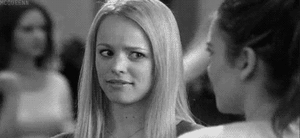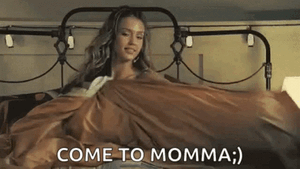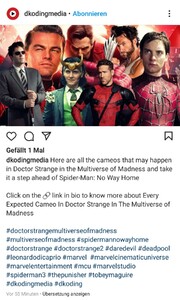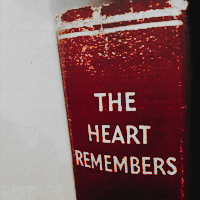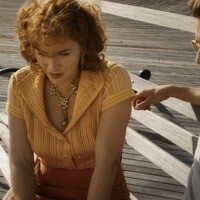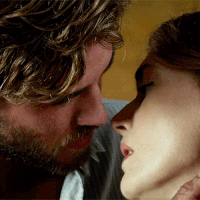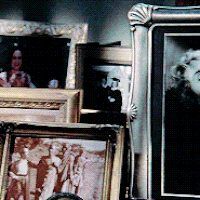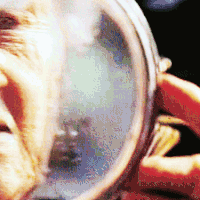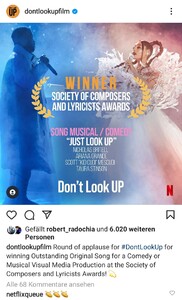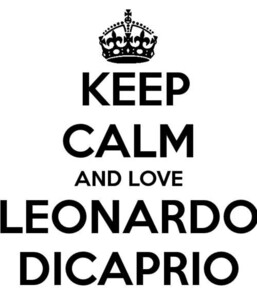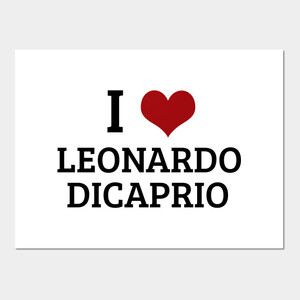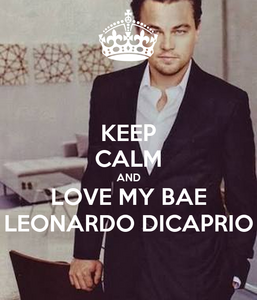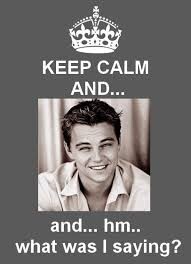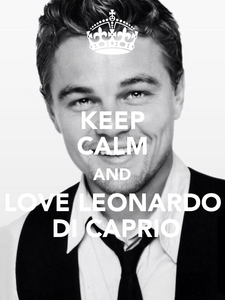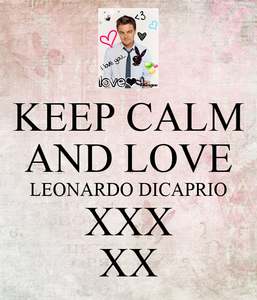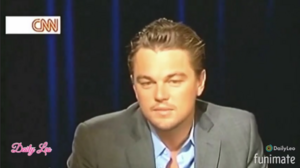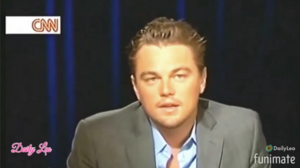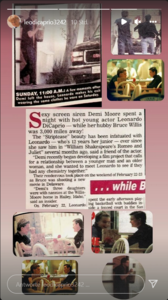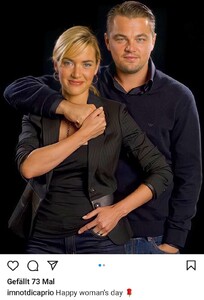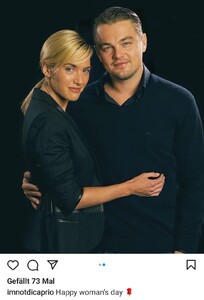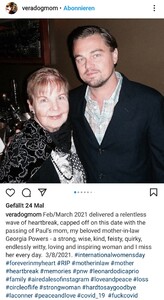
Everything posted by Jade Bahr
-
Leonardo DiCaprio - (Please Read First Post Prior to Posting)
And yet she would probably scream YES from the hills if she ever had the chance to work with him... or bang him.
-
Leonardo DiCaprio - (Please Read First Post Prior to Posting)
Maybe not the worst idea for the environmentalist he is. Especially when he was in England not so long before. I'm honestly a bit tired of the backlash he would get for attending a ceremony for nothing but trouble. But yeah a red carpet without Leo is always a pity.
-
Leonardo DiCaprio - (Please Read First Post Prior to Posting)
Period drama + Venetian masks You find Leo?
-
Leonardo DiCaprio - (Please Read First Post Prior to Posting)
Still one of my most watched movies not only from Leo but ever #guilty pleasure 😚🗿👑🗡️
-
Leonardo DiCaprio - (Please Read First Post Prior to Posting)
-
Leonardo DiCaprio (GENERAL DISCUSSION)
Mostly he's doing such walks to give a statement. So when he didn't make one with Camila after those splitting rumors I was kinda irritated. Honestly I still am LOL
-
Leonardo DiCaprio - (Please Read First Post Prior to Posting)
-
Leonardo DiCaprio - (Please Read First Post Prior to Posting)
^Is this some random ass on that cake or is it Mrs Thicke? Don't know much about the guy but he has some kinky taste in cakes 😄 Do you think everyone was allowed to taste a piece of... her? lmao
-
Leonardo DiCaprio - (Please Read First Post Prior to Posting)
Leo looks so fine in that clip
-
Leonardo DiCaprio - (Please Read First Post Prior to Posting)
-
Leonardo DiCaprio - (Please Read First Post Prior to Posting)
- Leonardo DiCaprio - (Please Read First Post Prior to Posting)
I would so watch this movie 😍 Movies I want to see: The life of Rose Dawson How she builds a life on her own after Titanic, deals with the trauma, decides to make her own fate, travels the world, survived two World Wars, falls in love again. I want to see how she lived, how she grew, what she did hold onto and what she did let go. I wanna see her take over her own fate.- Leonardo DiCaprio - (Please Read First Post Prior to Posting)
Leonardo DiCaprio, Dua Lipa and All the Stars Moving to Apple TV+ Apple TV+ is pulling out the big guns to try and get ahead in the streaming wars with some huge star power at its disposal. During Tuesday's Apple event, it showcased several new tech products, as well as some exciting new projects coming exclusively to the Apple TV+ platform. The likes of Leonardo DiCaprio, Martin Scorsese, Henry Cavill, Dakota Johnson, Dua Lipa, Ryan Reynolds and so many more famous faces have new original projects launching with Apple. Killers of the Flower Moon The Apple Original Films slate includes Martin Scorsese and Leonardo DiCaprio's next movie, Killers of the Flower Moon. The movie has been in development for half a decade and was purchased by Apple TV+ and Paramount Pictures. Killers of the Flower Moon is based on the non-fiction book of the same name which retells the story of the serial murder of members of the oil-wealthy Osage Nation in Oklahoma. DiCaprio stars in a lead role while the rest of the cast features Robert De Niro, Jesse Plemons, Lily Gladstone, Sturgill Simpson, Brendan Fraser and John Lithgow. The movie is described as "coming soon" by Apple with no firm release date announced. Source- Leonardo DiCaprio - (Please Read First Post Prior to Posting)
Would have loved to see Leos face when she said him that lmao Amanda Seyfried Once ‘Insulted’ Leonardo DiCaprio by Asking Him to Play Her Dad in a Movie Leonardo DiCaprio has played a variety of roles in his long and storied career. There seemed to be no limits to the types of characters he’d be willing to portray. But according to Amanda Seyfried, DiCaprio revealed he had his limits when the Mean Girls star wanted him to play her father. Not only did he reject the offer, but he was offended by the very idea. Leonardo DiCaprio was Amanda Seyfried’s role model It’s not hard to see why many actors, both aspiring and established, would look up to Leonardo DiCaprio. The Oscar-winner has maintained his career by headlining several blockbuster films. In addition to that, he’s played a roster of unforgettable characters that displayed his acting range. Amanda Seyfried is one such actor who admired DiCaprio for his cinematic contributions, although her interest in acting originally started with theater. (...) But if it wasn’t for Leonardo DiCaprio and Romeo + Juliet, Seyfried might not have found herself in the position she’s in now. “I love to watch movies. Love stories always inspire me. My role models were Claire Danes and Leonardo DiCaprio (in Romeo + Juliet). When they fell in love, that’s when I fell in love with movies and when I realized I wanted to be Juliet. I think every young girl dreams of being Juliet. Thank God for that movie or honestly, I wouldn’t be here,” Seyfried said. Amanda Seyfried insulted Leonardo DiCaprio when she asked him to play her dad Leonardo DiCaprio and Amanda Seyfried worked on the 2011 film Red Riding Hood. The film was a modern, darker retelling of the famous folklore, with DiCaprio serving as producer. Seyfried revealed in an interview with Access that she had a strong reaction when her role model would stop by while they were filming. “When [Leo] came to visit there was a weird tension on set,” Seyfried said. “Everybody was whispering, ‘He’s here! He’s here!’ You know, he’s like a godfather. He’s like [Robert] De Niro to the younger generation of actors.” She also shared that DiCaprio was very hands-on with the film when choosing who would star in the movie. “He was a big part of the casting process, which is good because his input is always wanted,” she continued. “He’s been working for a long time and he makes great choices.” However, at one point Seyfried wanted to recruit DiCaprio himself for the film. The Mean Girls actor even had a role in mind for him as her father. But it was a suggestion DiCaprio didn’t take too kindly. “I asked him if he would play my dad but he got insulted! He said, ‘I don’t do male leads in love stories anymore,'” she told The Mirror. “And I said, ‘I wasn’t talking about the male leads, I was talking about my dad. You’re what, 35? Age yourself up a bit!” Has Leonardo DiCaprio ever played a Dad? Despite refusing to play a father in Red Riding Hood, the actor has played a father before, but on rare occasions. As some know, he recently played a father in the Oscar-nominated flick Don’t Look Up. Inception and Revolutionary Road were also two films where DiCaprio technically took on Dad roles. Source- Leonardo DiCaprio - (Please Read First Post Prior to Posting)
^now that answer came quick. Thx Leo 😅 🥰- Leonardo DiCaprio - (Please Read First Post Prior to Posting)
This is getting more and more mysterious lol Maybe Leo should say something at this point to stay out of this or just to clear things? More important: Why would someone claim he donated money when he didn't? Weird.- Leonardo DiCaprio - (Please Read First Post Prior to Posting)
- Leonardo DiCaprio - (Please Read First Post Prior to Posting)
- Leonardo DiCaprio - (Please Read First Post Prior to Posting)
Don't know if this BD interview with CNN was ever posted but Leo looks so damn fine I went straight to heaven while watching it Source Back in 2006, Leo sat down with Documentary Filmmaker Sorious Samura to talk all about Blood Diamond & what it was like filming the movie which was based on the war in Sierra Leone and their conflicting diamond trade. Sorious Samura who had directed two documentaries on the war in Saralaon himself was a consultant on the movie & became an inspiration as well as a friend to all cast & crew involved with the movie.- Leonardo DiCaprio (GENERAL DISCUSSION)
Just some blast fom the past. "Demi recently began developing a film project that calls for a relationship between a younger man and an older woman, and she wanted to meet Leo to see if they had any chemistry." So she used Leo for research? lmao Wondering now if they had "chemistry" and if that "film project" ever happen LOL Not really familiar with her filmography. Only remember the time when she felt for a much older dude. Also this movie always made me questioning my own morals aka who would I bang for 1 million $- Leonardo DiCaprio - (Please Read First Post Prior to Posting)
Still wish Leos character was the center of the movie -because damn that would have been a hell of a crazy unhealthy ride- on the other hand he would be probably more slammed for working with Woody Allen nowadays lol Leonardo DiCaprio's Titanic Follow-up Perfectly Mocked His Own Image Leonardo DiCaprio plays a very exaggerated version of an out of control young actor in Woody Allen's black and white 1998 comedy Celebrity. After the unrivaled success of James Cameron’s romantic epic Titanic in 1997, leading man Leonardo DiCaprio followed up the blockbuster with a clever supporting role in a Woody Allen movie to mock his massive fame. DiCaprio had been a rising star, emerging from indie teen actor in dramas like What’s Eating Gilbert Grape to heartthrob in Baz Luhrmann’s Romeo + Juliet. But it was his swoon-worthy role as Jack Dawson that kickstarted what the press nicknamed “Leo-Mania.” DiCaprio was everywhere, with fans, critics, and journalists keeping a constant eye on the star. This made his Titanic follow-up an even more surprising choice. Grappling with such intense fame and fandom, perhaps akin to someone like Timothee Chalamet today, the actor chose to follow up his iconic Titanic role in the most polar opposite of ways; a small but showy performance in a black and white Woody Allen comedy aptly called Celebrity. Co-starring Kenneth Branagh, Wynona Ryder, Hank Azaria, Charlize Theron, and Sam Rockwell, the 1998 film pokes fun at a desperate screenplay writer and his relationship with different fictional actors and actresses. Branagh, who stars as the film’s hapless writer protagonist, attempts to get DiCaprio’s character to agree to be in his movie. Though DiCaprio appears for only 10 minutes of screentime, critics and fans of this movie seem to agree he stole the show. DiCaprio, known for his multiple movie deaths, plays Brandon Darrow, a spoiled and emotional young actor who beats up his girlfriend, trashes hotel rooms, travels with an entourage, does copious amounts of drugs, and lives in pure over-the-top excess. The Oscar-winner and environmental activist has said he has refrained from drugs and alcohol and has managed to stay scandal-free when it comes to his personal life – even amid his younger days. Despite that true image, it didn’t stop others from putting him into the same category as other out-of-control male idols. In Celebrity, DiCaprio gets to not only show off his acting chops but even address people’s pigeonholing of him through this performance. The role of Brandon Darrow allowed him to let off some steam while showing how self-aware he was at the time and that people’s expectations of him simply weren’t true. While the Alexandre Dumas adaptation The Man in The Iron Mask was technically his first post-Titanic release, DiCaprio had actually completed his dual roles before Titanic came out, making Celebrity his first true post-Jack Dawson appearance. Audiences tend to remember that film but completely missed out on Celebrity, which was both a critical and commercial disappointment, grossing nearly half of its 12-million-dollar budget. With some critics like Roger Ebert believing it was a retread of Allen’s previous work – the film, for the most part, faded into obscurity. As far as creative and self-expressive choices go, it stands as evidence that DiCaprio was not going to coast on fame or good looks and was instead committed to constantly challenging himself. DiCaprio has shifted significantly from the slender, young heartthrob of the late-1990s, appearing in gritty crime dramas like The Departed and the highly-anticipated Killers of the Flower Moon adaptation. He has proved time and time again that he is one of his generation’s most versatile actors and consistent box office draws. Though he has not done anything remotely as intimate or small as Celebrity, he has still continued to poke fun at his own image in comedy sketches and roles. It’s tough to imagine Leonardo DiCaprio taking on a small role in a Woody Allen comedy today, but at the time, despite the lukewarm reception, something small and fun was the perfect choice to follow something as significant as Titanic. Source Leonardo DiCaprio as Brandon Darrow in Celebrity (1998) Source- Leonardo DiCaprio - (Please Read First Post Prior to Posting)
^Happy international women's day to all the great ladies here with Leo just holding another great lady in his arms (well one arm lol) 💕- Leonardo DiCaprio - (Please Read First Post Prior to Posting)
- Leonardo DiCaprio - (Please Read First Post Prior to Posting)
And this is why DLU nailed it to be relevant forever. Sad but true.- Leonardo DiCaprio - (Please Read First Post Prior to Posting)
^I have this quote 👇 written on my Leo cardboard standee because truer words have never been spoken by a man lol 💯 - Leonardo DiCaprio - (Please Read First Post Prior to Posting)

